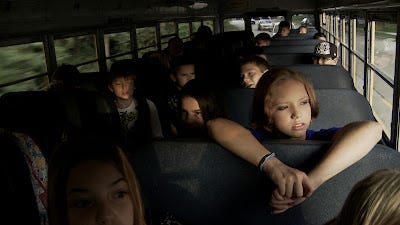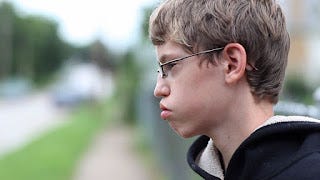Review: Powerful, emotional "Bully" documentary gives voice to the voiceless

Film Rating: A
It’s impossible for me to take an objective critical look at “Bully.” Given the subject matter and my own deep-seated scars from bullying in my past, I’m just too emotionally connected to the material. It’s probably true that the film has pacing issues, is unnecessarily repetitive in spots, and features a few artistic flourishes that come across as pretentious. But to me, none of that matters in the slightest. Director Lee Hirsch simply understands what it feels like to be victimized and voiceless, he knows where to lay the blame, and he’s willing to say things about the subject many would prefer to leave unspoken. The film is deeply personal and tremendously impactful, difficult to watch in many stretches and unflinchingly direct throughout. It is an important film, one that I hope finds a mass audience willing to take its messages to heart. Continue reading after the jump...

Hirsch follows five tormented students and/or their families, each from different walks of life, over the course of one school year; Kelby, a teenage lesbian from the bible belt whose entire town turned against her when she came out; Ja’Maya, a bullied girl from Georgia who turned to violence as a last resort; Alex, a young boy so used to constant harassment that he no longer recognizes it as a problem; and two sets of parents who lost their child to suicide. Each story is incredibly compelling – I was a complete wreck watching any of the scenes about Ja-Maya - and despite the no doubt considerable logistical challenges to filming underage subjects, the footage Hirsch gathered is disarmingly candid, allowing us an unclouded window into these peoples’ lives.

The result is an immediate and authentic atmosphere that dramatically heightens the emotional impact at every turn. If you’ve never been a victim of bullying, you’ll understand exactly what it feels like by the end of the film, and if you have experienced peer-based torment before, you’ll see yourself reflected in each of the five stories. Either way, it’s a harrowing experience, and I have boundless respect for all the students brave enough to come on camera and relate their plight to the world, and for Hirsch’s refusal to sugarcoat the horror of their stories.
But for me, the most powerful portions of the film deal with the ineptitude, or outright refusal, of public school administrators to take responsibility for the bullying epidemic. In my experiences with bullying, one of the hardest things to deal with was the abandonment I felt from the adults at school, and Hirsch captures that beautifully. When the parents of the film’s subjects plead to the Principle to do something, only to be given a generic political response, or organize a town hall meeting to address how administrators handle the problem, only for no one from the school to show up, or especially when the vile principle Kim Lockwood chews out a bullying victim for failing to get along with his aggressor, it all felt uncomfortably close to my own life experience. Anyone who has been bullied knows the American public school system deserves a large portion of the blame for failing to meaningfully intervene or educate students about how they interact, yet this sad truth has never been part of the national conversation. But Hirsch recognizes the facts, and his presentation of events shows a blunt and resolute insistence towards holding schools accountable for what they allow to go on in their halls.
Some viewers may be dismayed that the film never gets into a discussion of the root causes of bullying, but personally, I appreciated Hirsch’s tight, precise focus on how bullying changes lives and the ways adults can effectively address the problem. So many documentaries get bogged down trying to create a wholly comprehensive view of their subject, but the lean, direct nature of “Bully” allows Hirsch to deliver the message with clarity and power. If the bullying problem is ever going to be addressed, our nation needs to have a real, insightful conversation on the subject, and while “Bully” is unlikely to change the world on its own, it is a tremendous starting point for that discussion. “Bully” is bound to touch different people in different ways, but no matter what, it has the power to finally get people talking, and for that, I have nothing but respect for the film. It deserves my highest recommendation.

